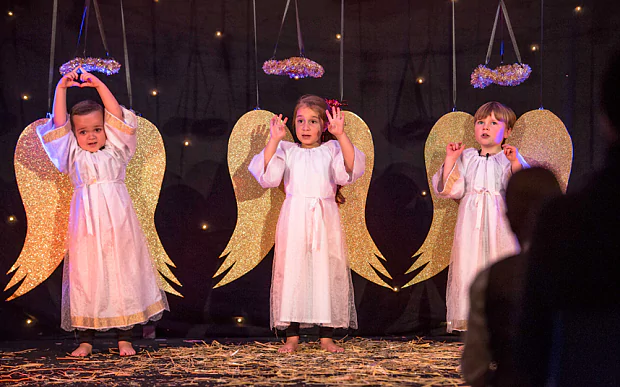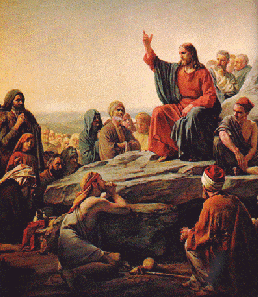It’s fitting at Christmas, when the West celebrates the birth of Jesus, to reflect on the full flower of his teachings. This statement is apropos: “Truly I tell you, unless you return and become like children, you can’t enter the kingdom of God.”
 Jesus was referring to something much more than his love for children in this saying. Indeed, this one sentence contains an entire religious philosophy, and the key to communion with the numinous.
Jesus was referring to something much more than his love for children in this saying. Indeed, this one sentence contains an entire religious philosophy, and the key to communion with the numinous.
The key phrase of course is “the kingdom of God.” What did Jesus mean by it? A hint is given by a single word, “return.”
Normally, when we think of return we automatically equate it with going back to some place or something. And Christmastime, despite its consumeristic and sentimental excess, holds a yearning to return home, return to childhood, return to innocence.
There’s also the idea in New Age circles of returning to our indigenous past as humans, or to some ideal or essence of self. As much emotional longing all these yearnings represent, such returns are not possible. Truly, you can’t go home again.
However what Jesus meant by return has nothing to do with going back to childhood or ‘homeland.’ To “return and become like children” entails looking again with innocent eyes, and thereby moving through the darkness within and without.
Even the most jaded politician speaks of the imperative of having “fresh eyes” on a problem. Of course, they’re referring to bringing in new perspectives more than cleaning the windows of perception in themselves.
That is what returning and becoming like children entails however—to look afresh at the habits, patterns and pathologies within one.
We accept and resign to the rottenness of society because we accept and resign to the rot within ourselves. We are continually moving away from it, both by the escapes of culture that reveres entertainment above all else, and by the ideal of what we want or think we should be.
Christianity has lost whatever capacity it once had to console the heart and animate the spirit. But Jesus would not think much of 2000 years of Christian social thought, since it has largely given us the abominable society we have.
And Christianity’s central tenet is just plain wrong—Jesus’ crucifixion was not the apotheosis of his life, affording us the comforting idea that he ‘was born to die on the cross for our sins.’ The tragedy of his death is the conundrum of his failed mission, and vice versa.
What is done in life cannot be undone after death. Only the living can forgive the dead.
To remain with what is is the simplest but rarest thing. Why is it so difficult? Why do we live in what’s been called ‘the corridor of opposites,’ with all the conflict and wastage of energy that doing so involves?
Is it that we don’t see how to see, how to look with the eyes of a child again? Is it that we don’t even see that we are in conflict, and that inner conflict absolutely drains the energy needed to face, understand and move beyond hate, anger and violence?
Therefore to return and become like children means, first and foremost, to learn how to see anew, as children do. Innocence of perception is the sine qua non of restoring innocence and purity of the heart.
Resigning to the accretions of experience, the hurts of relationship, the disappointments of life, and the failures to live up to some ideal imposed by parents and society, is to become a dead man or woman walking.
Jesus was pointing to the possibility, indeed the imperative of looking at the old within and around oneself with new eyes, the eyes of a child. Doing so diligently, there’s a restoration of innocence in our hearts, so that we can be a light to ourselves and others in these dark times.
As for “the kingdom of God,” it has nothing to do with a supposed afterlife. Jesus was concerned with life, and with this world, not with death or some future world. The Lord’s Prayer is present: “Thy kingdom come, thy will be done on earth, as it is in heaven.”
As Marcus Borg, writing in “Jesus, A New Vision,” said, “According to Jesus, what is needed is an inner transformation of the self at the deepest level. “Blessed are the pure in heart,” Jesus said, “for they shall see God.”
The continuum of light—from fresh perception to renewal of spirit to purity of heart to communion with Intelligence—moves in the opposite direction of the chain of darkness, without being in opposition to it.
So what is this kingdom of God, and can it ever come to this world? Humankind is as far away from its realization this Christmas as it has ever been. And yet, it may be true, the darkest hour is before the dawn.
Martin LeFevre

